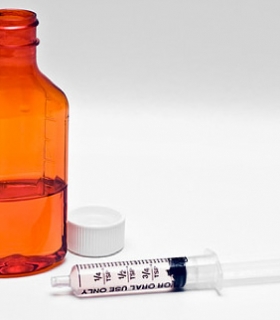- Two recent studies draw attention to a major public-health problem—medication errors involving children.
- Every 8 minutes a child is given the wrong drug or given the wrong dose
- Using teaspoon or tablespoon measurements can double the chance of dosing errors.
- Before you leave the doctor’s office make sure you understand how, when, and for how long your child should take any medication.
Putting too much vanilla in your cookie recipe isn’t the end of the world, but incorrectly measuring your baby’s medication can have serious consequences.
Two studies published this year draw attention to a major public-health problem—medication errors involving children. Children are particularly at risk because they are more sensitive to medications than adults. Prescriptions are based on a child’s weight and being off by just a few milliliters can be dangerous.
The Scope of the Problem
The most recent study found that every 8 minutes a child is given the wrong drug or given the wrong dose. The study evaluated out-of-hospital medication errors from 2002 to 2012 in the National Poison Database System. The results have helped the medical community get a better idea of the scope of the problem.
Results:
- There are more than 200,000 out-of-hospital medications errors reported to poison control centers every year: children under the age of six are involved in 30 percent of the cases.
- The likelihood of medication errors increased the younger the child, with children under one years old making up more than 25 percent of the cases.
- Almost 82 percent of errors involved liquid medication, with painkillers making up more than 25 percent of all cases.
- 27 percent of medication errors were from accidentally taking a dose more than once.
- Most the cases were treated at home, but 25 children died due to a medication error during the 11-year-study period.
Switching to Milliliter Measurements
Another study released in April 2014 found that giving parents teaspoon- or tablespoon-based measurements:
- Made it 2.3 times more likely that they would mismeasure the dose.
- Made it 1.9 times more likely that they wouldn’t follow the prescription accurately.
- Resulted in one-third of them using a kitchen spoon, which made it 2.5 times more likely they would pour the wrong dose.
- Could cause some confusion between what was a teaspoon and what was a tablespoon.
The study concluded that switching to milliliter measurements would help reduce dosing errors.
How to Get the Right Dose
Here are some important things you can do to make sure your child is getting the right medication at the right dose.
- Before you leave the doctor’s office make sure you understand how, when, and for how long your child should take the mediation. If you are confused, be sure to ask questions.
- Find out what you should do if you accidentally miss a dose.
- If the prescription is given in teaspoons or tablespoons, you can ask your doctor to change it to milliliters to make it easier to measure.
- Ask for an oral syringe, dropper, or dosing spoon from your doctor or pharmacist. You can even ask them to mark the right measurement on the dosing device for you.
- If using over-the-counter medications, only use the measuring device included in the package.
- Read the label each and every time you administer a medication to make sure you have the right medicine and haven’t forgotten the dose.
- To avoid confusion, keep all medications in their original packaging.
- Track when you gave the last dose and make sure you wait enough time between doses.
- Whenever possible, try to make just one person responsible for administering medicine.
- If multiple people are responsible for administering medications during the day, don’t just rely on your child’s memory. Instead use medication logs that give clear instructions on what medications should be given, how much, and when.
- If your child receives the wrong medicine or too much of a medication, call the poison-control helpline at 800-222-1222.
For More Information
Share this article:
